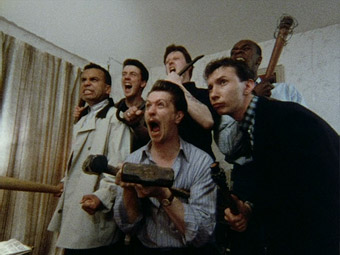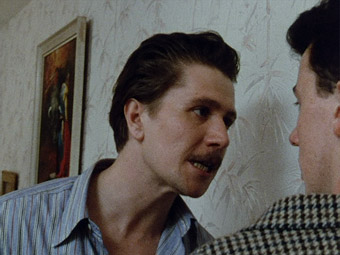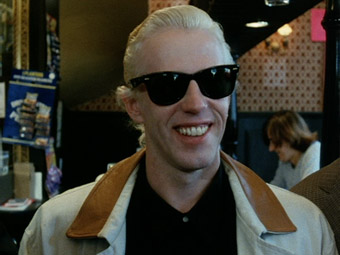"We come in peace, we leave you in pieces." |
ICC motto |
The
history of the football hooligan goes back to the early
days of the game itself, the tribal nature of the sport
attracting a small hardcore of hardened thugs that, having aligned
themselves under a particular, usually local flag, waged
war on anyone of opposing factions with fist, boot and even
knife. The early Roughs and later Bovver Boys were all perceived
to have come from a similar background, working class families
living on housing estates in large urban
areas. But in the 1980s a new breed
of hooligan emerged, one more organised and even more tribal in nature.
These were not the impoverished working-class boys looking
for an identity in a world out of their control, but affluent young
men in well paid jobs. They were the product of Margaret Thatcher's
skewed vision of Britain, where collective action was
demonised and good and bad citizens alike were encouraged
to think of themselves first and get rich any way they
could, irrespective of the cost to those around them or society
in general. From this grew a new mouthy and obnoxious entrepreneurial
class and a new breed of hooligan. Using football as a
banner under which to unite, they formed organised gangs
that would not just fight on their home turf, but actively
hunt out opposing groups and take them on. This was organised
war, a new kind of thuggery for a new kind of middle class.
These gangs were known as Firms.

By
the time he came to make The Firm, Alan
Clarke had established himself as one of the most boldly
exciting and innovative directors working in British TV
drama. His TV play Scum had caused a ruckus at the BBC and was banned by the very corporation that comissioned it. His response was to re-film the whole thing on 35mm and release it as
a feature. The result attracted both praise for its honest
directness and committed performances and criticism from
Conservative politicians, who were outraged that someone would have the audacity to expose what many did not realise was going on in British borstals
of the time. Made
in Britain teamed Clarke with the equally adventurous
David Leland, but as Leland eventually went on to direct
more mainstream projects such as The Land Girls and Band of Brothers, Clarke's work became
increasingly confrontational and experimental, reaching
its peak with his 'walking films', which included Road and the brilliant Elephant. The Firm was to be Clarke's final film (he died
of cancer just two years later), made when knowledge of
this new breed of hooligan was not as widespread as it has since become, and grew in part from the director's own anger at the people
he felt were ruining a game that he loved.
Clive 'Bex'
Bissell is a successful young estate agent who lives in
a London suburb with his wife and small child. He is also
the head of a local firm, the Inter-City Crew (ICC, based on the West Ham Inter-City Firm, some of whom acted as consultants on the film), whose
main rivals are The Buccaneers led by white-haired Yeti
and a Birmingham-based crew led by hard-nosed Oboe. Bex
has ambitions to lead a united firm into Europe and calls
a conference to propose the idea to the rival gangs. They
pour scorn on his suggestion but set Bex a challenge – if
the ICC can fight each of them on their home turf turf and beat them,
they will fall in behind him and follow him to Europe.
From
the opening Steadicam shots focusing on Bex's head and
cocksure stride, Clarke establishes that this is to be less
a film about the firm itself than its enigmatic leader, and he scores
his first gold in the casting of a young Gary Oldman, who
brings a sometimes ferocious energy to an unlikable but
still compelling central character. Bex is a symbol for
the self-centred, destructive element that was so symbolic
of 80s Britain, all outward respectability – the nice house,
the family, the decent car – under which lurks a barely
controlled monster. He fights not for his family or friends or any
real cause of note, but because he "needs the buzz."
Neither hard
drink not drugs are part of Bex's make-up, providing no
get-out clause for his behaviour – his addiction lies in the thrill of inflicting violence on others. The only time he even enters a pub
is to beat its occupants senseless.

Bex
certainly has some serious issues, his fragile self-image being
both his driving motivation and his achilles heel. After
directly challenging Yeti and Oboe, he cheerfully drops
round to his parents' house, where his old bedroom remains a holding cell for the weapons
of his trade. Having reacted with resolutory calm to the earlier
defacement of his car, it is here we first glimpse
the tormented creature that simmers beneath, as he carefully
arranges a pillow that he then repeatedly and angrily clubs,
furiously yelling the names of his hated rivals as the blows
rain down. Later, when things aren't going so well and one
of the gang talks about leaving, he turns on him in a sudden
burst of controlled fury that instantly brings him into
line – their final mission may seem suicidal, but it is
still preferable to having Bex as an enemy.
By then the
ICC firm is falling apart. Having suffered a serious
defeat at the hands of Oboe's ambush and Yeti's hit-and-run
tactics, there seems to be nowhere for them to go, but in
a brutal final fight the monster inside is finally unleashed,
most graphically realised in the animalistic scream Bex
lets loose after beating his opponent within an inch of
his life. Oldman sells this right down the line – the cocky
estate agent, the jokey but still devoted Dad ("Shall
we tell mummy to piss off?"), the put-upon husband,
the ambitious would-be leader, the threatening soldier and
the out-of-control monster – and the transition from one
to another is always convincing. His relationship with his
wife (impressively played by his then real-life wife Lesley
Manville) in particular is most realistically handled, from
the saucy small-talk to the screaming rows – the dialogue
and delivery here are always just right.
As
usual with Clarke, almost all of the performances are
spot on. Phil Davis, in a role originally offered to Tim
Roth (can you imagine?), plays Yeti with a winning combination of cool control and sneering superiority, and
Andrew Wilde makes for an effectively intimidating Oboe. The soldiers
in the firms themselves are played with energy, but this
brings me to a couple of issues I have with this aspect
of the film. Bex's ICC firm are made up almost exclusively
of familiar faces from British TV and film drama of the
time, and although all are fine actors, they're just not that imposing, and it's kind of hard to believe the
ICC ever won a fight with some of these guys on board. Equally problematic is the racial mix of the three
firms – given the very unpleasant racism endemic in this
aspect of football hooliganism, it seems unlikely that such
a cosmopolitan mix could be found in any firm of the time,
let alone all of them. But I have to suspect this was a
deliberate ploy on the part of Clarke and screenwriter writer Al Ashton to focus our attention on the violence of men like Bex and the driving
force behind it – this is a tribal rather than racial issue
and to try tackling both would have potentially sidetracked
the single-minded nature of the drama, split it two ways.
That, perhaps, is a subject for another film.*

But
everything else is just right. I grew up knowing these people
and recognise almost every one of them as real. The detail
in Ashton's script and Clarke's handling is just bang-on,
especially in the specifics of the dialogue, which is always
authentic to the place and time, even in off-hand moments
("You wanna T-Cut that," Bex's dad advises on
seeing his son's defaced motor, to which Bex replies "I
don't believe you sometimes – needs a new skin, that does").
This even extends to their choice of clothing (these guys
liked to look good) and cars, with sporty, soft-top
Ford Escorts and performance BMWs, which is still the wanker's car of
choice in my neck of the woods. The Buccaneers' targeting of these
vehicular status-symbols appropriately links the activities
of the firms to the capitalistic aspirations and lifestyles
of their members. Indeed, when the Buccaneers demolish the
Hornchurch Boys' car in a terrifically edited series of
quick cuts, it is, for the car's owner, the final straw,
and the end of his time with Bexy's firm. He will take an
assault to his body, but not to his treasured possessions.
Elsewhere there are nicely low-key references to Bex's financial
status in his casual insistence on first class tickets for
the trip to Birmingham and his jovial "Well if you've
got it..." response to his Dad's suggestion that he
is just throwing money away by having his car resprayed.
All of which prefigures the present day hijacking
of what was originally a working class game by those with
the money to buy insanely expensive season tickets, a new
club strip for their kids every few months, and even a seat
in the company box, where they are protected from the horrors
of weather and ordinary people, and where the game itself
becomes a distantly located background entertainment.
Clarke's
direction is terrific throughout, his handling of the actors
matched by his intuitive cinematic smarts. Shot entirely on Steadicam,
the film is largely a mixture of drifting, gracefully circular
camera moves and long tracks of Bex as he strides ever-purposefully
down roads or corridors. Clarke holds these shots for longer
than most other directors would and the effect, as in his
'walking movies', is to connect us completely with his central
character, forcing us to watch his face as he attempts to
keep that monster inside in check. These long takes give
way to faster cutting in more action-driven scenes – the
use of urgent editing and grabbed shots in the fights, combined
with the committed physicality of the actors, creates a
strong flavour of the viciousness of these conflicts without
showing us much in the way of graphic detail.
On
its first TV showing, the violence was inevitably a controversial
issue, but it is central to what the story is about and
thus an essential component. The fights in particular
are handled with brutal realism, the furious chaos of an
all-out rumble caught with documentary authenticity. If
Clarke holds back from showing us the most unpleasant assault
– a double nostril splitting** – the suggestion of its extreme
nastiness still comes through, and it is somehow appropriate
that the very same knife is involved in the film's most
genuinely horrifying moment, when in the middle of row with
his wife over his recent behaviour, Bex fails to notice
that his infant child has picked up the weapon
and is using it as a toothbrush. This moment powerfully
calls into question Bex's sense of responsibility and his
priorities regarding his family, as well showing most graphically
how his addiction to violence will eventually destroy
everything he holds dear.
The
film climaxes in two compelling Steadicam tracks and a particularly
vicious fight, which itself comes to a tragic but almost
inevitable conclusion, given the escalating nature
of the violence between the warring gangs. But it is the
final five minutes that are the film's coup-de-grace, a
largely improvised scene in which the newly united firms
passionately justify their way of life to a TV crew.
As the interview progresses, emotions run high and the interviewers
lose control of the situation – talking gives way to shouting,
beer is thrown at the camera and argument mutates into ritualistic and
nationalist chanting. Suddenly even the weakest-seeming
member of the ICC mob seems threatening, and as a combined
force they seem frighteningly unstoppable.
It is Hornchurch boy Billy (played by a young Steve McFadden,
later to make is mark on TV as hard man Phil Mitchell
in Eastenders) who leaves us with this
scene's most sobering message: "If they stop it at
football, we'll go to boxing, we'll go to snooker, we'll
go to darts...." Brilliant, compelling, chilling television.
Shot
for TV on 16mm, there is a lot of grain visible on the Second
Sight UK release, and far from playing it
down, the transfer actually seems to emphasise it, in darker scenes turning
the grain itself into very visible compression artefacts.
A lot of UK TV in the 70s and 80s was shot on medium to
fast 16mm stock, but there is no reason why a decent transfer
cannot render even a grainy picture in (at least) presentable
fashion – take the BBC's reissue of Edge of Darkness or VCI's release of Ken Loach's Riff-Raff,
for example. (Oddly enough, VCI's disk of Loach's Raining
Stones suffers form the very same grain/compression
issues evident here.) Though still very watchable, this
is distracting at times. Contrast is generally good, with
solid blacks and reasonable detail, and we are still a step
up from any VHS version. Grain aside, the print used is
in good shape with very little dust or dirt.
|
Second
Sight UK disk
|
| |
|
Blue
Underground US disk |
The
transfer on the Blue Underground disk is a considerable
improvement on the Second Sight release. Though the grain
is still present, it is far less obtrusive and the darker
scenes are in considerably better shape. Contrast and colour
rendition are superior here, black levels more impressive
and the picture is noticeably sharper. Additionally, as
can be seen from the screen grabs above, there is slightly
more picture information on all sides.
Sound
is Dolby 2.0 mono, with sound spread across the front sound
stage. The soundtrack is free of hiss and pops and in good
shape otherwise.
The
Second Sight disk hasn't a single extra, reflecting its
budget-price status (it was released for £5), leaving
the way open for Blue Underground to really deliver. Except
they don't. Unlike the other films in their excellent Alan
Clarke Collection, there is no commentary and
no accompanying documentary, a real shame considering how
potentially informative either of these could have been.
Given the quality of the extras on the other disks in the
set, I have no doubt this was not for the lack of trying,
but it's still a bit of a disappointment.
What
we do have are two Stills Galleries.
The Production Stills section
boasts 49 promotional stills and, somewhat ironically, the
DVD cover for the Second Sight UK DVD release under examination here as a comparison disc. The stills maximise the screen
area, which makes a most welcome change, though a good fifty
percent of them are of Gary Oldman and Lesley Manville in
Yobby husband and put-upon wife pose. Behind the Scenes has just five photos, but they are of Clarkey in action
so are a worthwhile inclusion nonetheless.
Alan
Clarke was one of the most important directors working in
British television in the 70s and 80s, but a ludicrously
small amount of his output has been made available on DVD
until now, with previous DVD releases of his work tending
to suffer from average (at best) transfers and a complete
lack of extras. The Firm was his final
film and a mother of a work to go out on – despite minor
niggles over support player casting and the (lack of) racial
politics, this is marvelous television, the sort of dangerous,
fired-up auteurist drama that was always rare, but has now
completely vanished from British TV.
The
Second Sight DVD was released some months ago at a bargain
basement price, and suffers from what looks like artificial
grain emphasis and a complete lack of extras. A shortage
of extra feature on the Blue Underground disk is also a
disappointment given the other films in the set, but the
transfer is considerably better than Second Sight's, it's
on the same disk as the brilliant Elephant and is part of the best box set of the year. Go with Blue
Underground.
* As it turns out I was wrong on this point, as the racial mix in the film was in some ways accurate reflection of the makeup of the very crew The Firm was based on. Indeed, the ICF's most famous member was black-skinned Cass Pennant, author of several books on football holliganism and the subject of a feature film of his own. That said, video evidence of the ICF in conflict with other firms tend to be dominated by white faces on both sides.
|